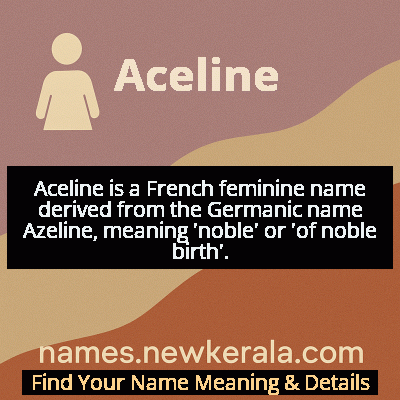Aceline Name Meaning & Details
Origin, Popularity, Numerology Analysis & Name Meaning of Aceline
Discover the origin, meaning, and cultural significance of the name ACELINE. Delve into its historical roots and explore the lasting impact it has had on communities and traditions.
Name
Aceline
Gender
Female
Origin
French
Lucky Number
4
Meaning of the Name - Aceline
Aceline is a French feminine name derived from the Germanic name Azeline, meaning 'noble' or 'of noble birth'.
Aceline - Complete Numerology Analysis
Your Numerology Number
Based on Pythagorean Numerology System
Ruling Planet
Uranus (Rahu)
Positive Nature
Strong sense of order, loyal, practical, and disciplined.
Negative Traits
Stubborn, overly serious, rigid, and prone to feeling restricted.
Lucky Colours
Blue, gray.
Lucky Days
Saturday.
Lucky Stones
Blue sapphire.
Harmony Numbers
1, 7, 8.
Best Suited Professions
Managers, engineers, accountants, organizers.
What People Like About You
Dependability, discipline, practicality.
Famous People Named Aceline
Aceline of France
French noblewoman
Daughter of King Robert II of France, known for her charitable works and founding religious institutions
Aceline de Porhoët
Breton noblewoman
Countess of Porhoët who played significant political role in medieval Brittany
Aceline de Bourgogne
Duchess
French noblewoman who married into the House of Burgundy and supported monastic reforms
Aceline de Joigny
Crusader noblewoman
Accompanied her husband on the Seventh Crusade and documented her experiences
Name Variations & International Equivalents
Click on blue names to explore their detailed meanings. Gray names with will be available soon.
Cultural & Historical Significance
During the High Middle Ages, Aceline represented not just social status but also the idealized virtues of nobility—grace, dignity, and moral excellence. The name's association with noble lineage made it a marker of social identity and family heritage. In medieval French literature and courtly romance, characters named Aceline often embodied the chivalric ideals of beauty, wisdom, and virtuous conduct. The name's usage declined after the Renaissance but experienced minor revivals during the Romantic period when medieval names regained popularity among the European aristocracy and intellectual elite.
Extended Personality Analysis
Individuals named Aceline are often perceived as possessing an innate elegance and refined demeanor that reflects the name's noble origins. They typically exhibit strong leadership qualities combined with diplomatic skills, making them natural mediators in social and professional settings. Acelines are known for their intellectual curiosity, artistic sensibilities, and appreciation for beauty in all forms—from art and music to nature and human relationships. Their noble bearing often translates into a strong sense of personal integrity and ethical principles that guide their decisions.
While they may appear reserved initially, Acelines form deep, meaningful connections with those they trust and demonstrate remarkable loyalty to friends and family. They often excel in creative fields, education, or roles requiring strategic thinking and cultural awareness. The combination of their aristocratic name and cultivated personality frequently positions them as trendsetters who value tradition while embracing innovation. Their natural grace under pressure and ability to maintain composure in challenging situations makes them respected figures in their communities, embodying the modern interpretation of 'noblesse oblige' through their actions and contributions.
Modern Usage & Popularity
In contemporary times, Aceline remains a rare but cherished name, primarily used by parents seeking unique names with historical depth and aristocratic connotations. While it never reached the popularity of its variant Adeline, Aceline has seen a modest resurgence in France and French-speaking regions since the 1990s. The name appears occasionally in birth registries in Quebec, Belgium, and Switzerland, often chosen by parents with interest in medieval history or family connections to French nobility. In English-speaking countries, Aceline is extremely uncommon but occasionally selected by parents looking for distinctive names with European flair. Modern usage trends show it's particularly favored by educated, upper-middle-class families who value cultural heritage and uniqueness over mainstream popularity. The name's rarity makes it appealing to parents wanting their daughter to have a distinctive identity while maintaining classical elegance and historical significance.
Symbolic & Spiritual Meanings
Symbolically, Aceline represents nobility of character rather than mere social status, embodying the ideal that true nobility comes from virtue, wisdom, and moral strength. The name carries connotations of grace under pressure, much like the medieval concept of 'noblesse oblige' where privilege entails responsibility. In metaphorical terms, Aceline symbolizes the flowering of human potential—the transformation of innate qualities into refined character through education and experience. The name evokes images of medieval tapestries, illuminated manuscripts, and Gothic cathedrals, representing the intersection of spiritual and worldly excellence. Like the lily often associated with French royalty, Aceline suggests purity, dignity, and natural elegance. The name also carries subtle connections to the concept of lineage and heritage, representing the continuity of values across generations while allowing for individual expression and modern interpretation of traditional virtues in contemporary society.

